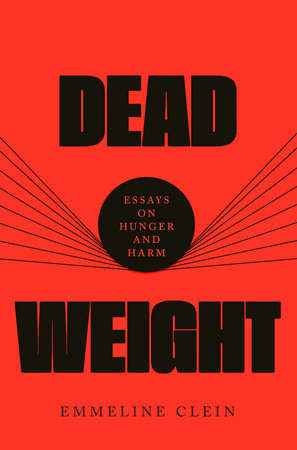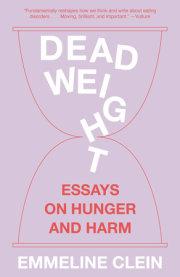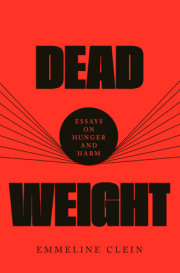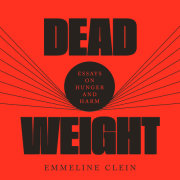“Dead Weight by Emmeline Clein is one of the smartest, most well-reported books I’ve ever read on the root causes of our culture’s disordered eating . . . Fascinating and insightful.”
—Katie Couric
“Emmeline Clein’s Dead Weight seems destined to fundamentally reshape how we think and write about the subject of eating disorders. What separates Clein’s book from others on the topic is her commitment to treating the sufferers of eating disorders with the kind of dignity that clinicians tend to withhold. Dead Weight not only exposes how little control patients have had over their own narratives and bodies, it returns the narrative to those who have suffered from the disease. This is a moving, brilliant, and important book.”
—New York Magazine
“Dead Weight is a book you must read . . . It is, in its broadest sense, a hopeful book offering an alternative, communitarian way of existing in our bodies and in the world.”
—Jezebel
“This book is a bomb, made of all of the fury and intensity of any girl who wonders what exactly they are hungering for. Emmeline Clein, everybody! The Joan Didion of the Tumblr era. This manifesto is meant to be devoured, in all of its witty, compassionate, feverish, elegantly argued brilliance.”
—Kate Zambreno author of Heroines
“Dead Weight is a lyrical and scrupulously researched portrait of disordered eating in its many manifestations, which is also, of course, a portrait of this country's disordered relationship to women's bodies. An authoritative, generous, and persuasive debut that I wish I could go back in time and gift to my teenage self.”
—Melissa Febos, author of Girlhood, winner of the National Book Critics Circle Award
"Canny . . . Persuasive."
—New Yorker
Emmeline Clein’s new essay collection Dead Weight: Essays on Hunger and Harm enters the ED discourse like a red-bound blaze of light, skillfully interweaving multiple stories about eating disorders, from the author’s own to those of “historical figures, pop culture celebrities, and the girls she’s known and loved.”
—Vogue
“Dead Weight is a blistering debut— stylish, sharp, and smarter than anything else I’ve read about the fraught and gendered terrain of disordered eating in America. These essays are kaleidoscopic and virtuosic: With rigor and curiosity, she writes about Simone Weil and the history of the virtuous anorexic saint to the arrival of Ozempic on the mass market to the moral question of categorizing an eating disorder patient as ‘terminal.’ Deeply researched, highly literary, rageful and tender, Dead Weight offers new and urgent angles on this familiar subject.”
—Jordan Kisner, author of Thin Places
“Stunning . . . With top-notch reporting, frankness, and humor, Dead Weight thumps with imagination and insight.”
—Wendy Walters, author of Multiply/Divide
“Eviscerating . . . An assiduously researched and urgent debut . . . Blistering.”
—Nylon
“Dead Weight seems destined to fundamentally reshape how we think and write about the subject of eating disorders. What separates Clein’s book from others on the topic is her commitment to treating the sufferers of eating disorders with the kind of dignity that clinicians tend to withhold . . . This is a moving, brilliant, and important book.”
—Vulture, “Best Books of 2024 (So Far)”
“[Clein] pulls no punches in her analysis of eating disorders and their psychological underpinnings, and her prose style is urgent, intense, and often captivating . . . This is a book that deserves attention—not just by those suffering from eating disorders, but by anyone trying to understand this insidious phenomenon.”
—Kirkus Reviews [starred]
“Essayist Clein’s stellar debut collection probes the inciting factors and effects of eating disorders in young women . . . Clein skillfully weaves together pop culture anecdotes, personal reflections, and analysis of social media posts in prose that’s vivid and sharp . . . This announces Clein as a talent to watch.”
—Publishers Weekly [starred]
“Dead Weight is part eating disorder theory, part history, part collective memoir of modern girlhood and part condemnation of the corporate, heteropatriarchal forces that demand the impossible of girls and women: self-objectification and self-disappearance, somehow simultaneously . . . Sweeping.”
—Bomb Magazine
“Dead Weight approaches its subject from a range of directions: it is, among other things, a memoir; a cultural critique of the “skinny, sexy sad girl” media of the 00s; an anti-capitalist polemic, and a history of fatphobia and its relation to white supremacy. It’s a remarkable book. Dead Weight is harrowing and infuriating, but it’s not unremittingly bleak: Clein’s graceful, lyrical prose and her deep belief in solidarity and sistership shine throughout the book.”
—Dazed
“A dense, complex collection, outright scathing in its assessment of systemic failures; generous in its compassion for those experiencing ED; familiar in its textual and pop-cultural references and earnest in its pursuit of a healthier society.”
—Elle
“Fiercely galvanizing . . . I have rarely read such intimate, revelatory, exhaustive, and sensitively strong writing as in Emmeline Clein’s essays. Her insight leaves me both close to tears and ready to revolt."
—Public Seminar
“Sweeping and incisive . . . Clein has hit upon the zeitgeist . . . It’s in the moments during which Clein peeks through as our guide—at once a vulnerable, self-proclaimed “sister” and an investigative mastermind—that Dead Weight proves imperative . . . Striking and arrestingly different . . . Compassionate, cerebral . . . That this compassion is deftly interwoven with such scrupulous research is at once a testament to Clein’s storytelling powers and an insistence that we take this seriously . . . Clein has marshaled her considerable powers to unearth and elucidate the reasons we think of ourselves as problems to manage in the first place.”
—Los Angeles Review of Books







